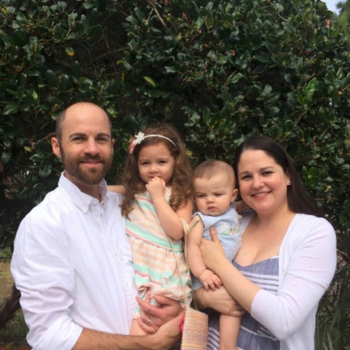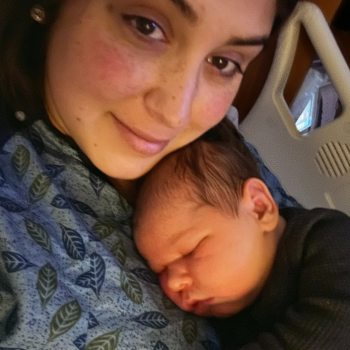
Double Trouble
April 12, 2024 By Lisa Suttles

As if having preeclampsia with one pregnancy wasn't enough, I had preeclampsia with both pregnancies!
Being an ob nurse I was fortunate to know the signs and symptoms of preeclampsia and to get help. Luckily, I was at 36 weeks both times preeclampsia struck, which meant my babies were safe to be born early. But the experience of preeclampsia and the ensuing challenges were unexpected and overwhelming.
I know that preeclampsia is not rare, and is life-threatening. That’s why even though I never thought it would happen to me, when it did happen it was no less a surprise and was both physically and emotionally devastating.
I share my story with women now because even sometimes the most educated among us can be caught off guard and have to deal with a medical crisis that was not only unexpected but can also seem very out of control. I want all women to know the signs and symptoms of preeclampsia so that they can have the conversation with their doctor and be monitored accordingly.
During both pregnancies my blood pressure became elevated at 36 weeks. Often times, this happens much earlier in the pregnancy when preeclampsia is setting in - between 20-29 weeks. This condition caused me to have labor induced. Luckily, my babies did well at just 4 weeks premature. After my first delivery, I was depressed as the preeclampsia put a damper on the experience and I mourned the loss of that joy. I recovered well but did require blood pressure medication for 6 weeks.
With my second baby preeclampsia created a life-threatening complications. Because of my previous experience with preeclampsia, I was monitored closely from the outset of my pregnancy. Late in the pregnancy I felt I was home safe with just a couple of weeks to go with not sign of preeclampsia. And then, on one day, again at 36 weeks, and without warning, my blood pressure spiked to 200/120. My son was delivered that day - the doctor was not taking any chances.
All was going well until the day I was supposed to leave the hospital. I developed a severe headache and after a MRI it was determined I had posterior reversible encephalopathy syndrome (PRES), which is caused by preeclampsia. PRES is leaking of fluid in the brain that is caused by severe hypertension. And it could — and did — cause me to have a grand mal seizure. Because I was not in a part of the hospital that was readily equipped to deal with this seizure, I seized for 5 minutes and am very fortunate to not have long term permanent damage.
However, I was admitted to ICU and spent the next 9 days in the hospital. My colleagues and husband witnessed the seizure, and all told me later how upsetting it was that they did not know what was going to happen to me.
The aftermath was an emotional rollercoaster. I had extreme fear and high anxiety. I was sad that I missed so much of my baby’s first days. I was homesick, had panic attacks, and was not able to hold my son or shower without supervision in the event I had another seizure. I couldn’t drive for 6 months. As a healthcare provider I could not believe this had happened to me. It was a very scary time! Now, finally, at nearly 7 months postpartum I have made a nearly full recovery.
My message to women is to be educated.
No, unfortunately we don’t know how to stop preeclampsia, but by being aware of symptoms, having a good relationship and open communications with your healthcare team, and knowing your body, you can help catch preeclampsia early, which can help save the lives of moms and babies. Moms should also know that preeclampsia is a risk factor for developing heart disease within 5 to 15 years after preeclampsia. Be sure to tell your doctor if you have this risk factor so that your heart health can also be monitored the years ahead.

My perfect daughter, Katie, gave birth to her first child just eight days before she passed away due to postpartum complications. Her deliver...
ReadMore- Thankful I Decided To Go To the Er That Night May 06, 2025
- My Journey With Preeclampsia and the Early Arrival Of My Twin Girls May 06, 2025
- My Experience With Hellp May 06, 2025
- A Mother’s War: What Preeclampsia Stole From Me May 06, 2025
- Miracle #2 May 06, 2025
- Induction at 40 weeks and 5 Days May 06, 2025
- Sharing My Story To Maybe Help Others! May 06, 2025
- The Little Rainbow Who Could May 06, 2025
- A Silent Storm: Our Battle With Postpartum Preeclampsia May 06, 2025
- Surviving Preeclampsia: My Story Of Strength, Intuition, and A Little Miracle May 06, 2025
